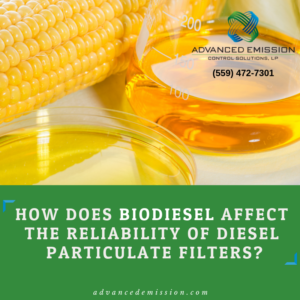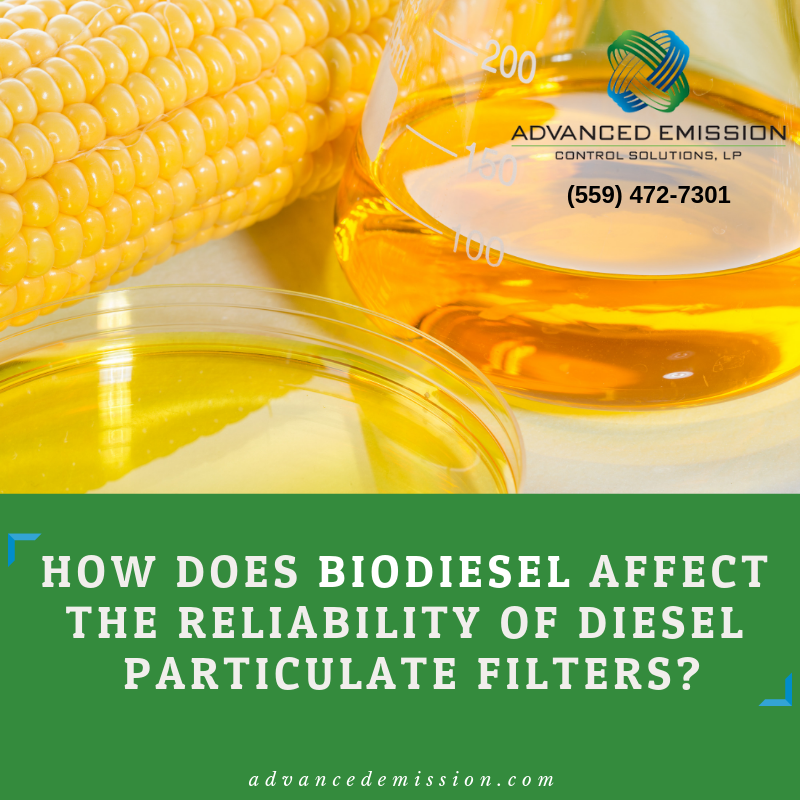How Does Biodiesel Affect the Reliability of Diesel Particulate Filters?

Diesel particulate filters (DPFs) are the dependable heart of emission control under the hoods of trucks and busses on today’s roads. When combined with filling up with biodiesel fuels, greenhouse gas emissions are reduced by as much as 86% as compared to using traditional petroleum diesel, according to the EPA. (Source: Biodiesel.org)
Biodiesel, produced from vegetable oil and animal fat long chain fatty acids, is the first and only EPA-designated Advanced Biofuel diesel fuel replacement. The national, commercial-scale production and availability of biodiesel production increased in popularity, with the production of about 25 million gallons in the early 2000s over 2.8 billion gallons in 2016. This environmentally sound fuel replacement boosts the U.S. job economy, reduces our dependence on global oil markets, and reduces the frequency fuel price spikes, in addition to cleaning up the air we breathe.
But dependence on biodiesel comes with cautions. These setbacks are conclusions from research performed by the National Renewable Energy Laboratory, the Alternative Fuels Data Center, the Society of Automotive Engineers, and Energy.gov:
- To prevent voiding out engine warranties, only rely on biodiesel blends up to 5% (B5)
- Source biodiesel fuel only from a BQ-9000 Accredited Producer or Marketer
- Engines built before 2004 may not be compatible with biodiesel
- Plugged-up DPFs are more common with biodiesel fuel blends—While biodiesel can clean fuel systems, it deposits the debris in the DPFs
- Biodiesel blends contaminated by phosphorus, alkaline, or alkali metals may lead to premature malfunction of DPFs due to increased deposits
- Biodiesel fuel creates an increased probability of microbial contamination, leading to early DPF plugging or corrosion
With preventative maintenance, you’ll stay on the road without the need of hauling around spare DPFs on board. You’re in the driver’s seat to ensure the lifespan of your DPF stays in check.
Here at AECS, our DPF experts recommend making a pit stop to clean DPFs at least once every 150,000 miles to avoid permanent damage and DPF cracking once ash hardens. Retrofit DPFs require cleaning at least once per year or at least every 100,000 miles of travel.
We rely on our advanced FSX DPF cleaning equipment to do the job, because it is the ONLY cleaning system independently approved by OEM engineers. Our first cleaning will set a benchmark—the process starts with the ONLY industry-standard evaluation of airflow restriction. Any damage to your DPF will be noted during the first 2 minutes of cleaning. Rely on the ONLY system that cleans both sides of your DPF, followed by 100% removal of DPF soot. Watch our equipment in action.
We’ll deliver the results of your DPF airflow tests and display them alongside established airflow baselines to certify your DPF is ready to go. Based on your biodiesel blend usage, DPF wear-and-tear, and other factors, our DPF specialists will offer you custom recommendations regarding scheduling follow-up DPF cleaning and maintenance.
Can’t afford to take your trucks offline for DPF evaluation and cleaning? Our mobile DPF cleaning service comes to the rescue! Biodiesel fuel blends are no match for our DPF service that meets you where you are parked. Avoid nullified DPF warranties or an unexpected need to replace a DPF (that can cost upwards of $8,000). You’ll receive the same level of service as with our in-house DPF cleaning—Our mobile service also provides evaluation and recommendations from our trusted DPF service team.
What are you waiting for? Maintaining clean emissions using biodiesel fuel blends rides in tandem with maintaining clean emissions with ash and soot-free DPFs. Contact us to get on the DPF cleaning schedule: 559-472-7301

